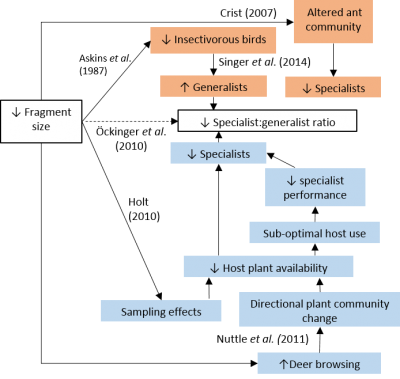The alteration of ecological networks by environmental change, including habitat fragmentation, is not well understood. This project will test alternative mechanistic pathways for loss of trophic specialization due to habitat fragmentation in a plant-herbivore-carnivore network. Elucidating these pathways will greatly improve predictive models of the impacts of fragmentation, which threatens habitat- and host-specialist species with local and global extinctio n. Focusing on a complex, tri-trophic ecological network of larval Lepidoptera, their hostplants and avian predators, we will establish the contributions of bottom-up and top-down mechanisms to altered absolute and relative abundance of specialist herbivores in forest fragments in Connecticut. Host-plant availability may be modified by sampling effects and deer browsing, filtering out host-specialists or forcing them to use sub-optimal plants. Birds preferentially attack generalist caterpillars so the well-documented effects of fragmentation on bird communities could reduce the relative abundance of specialists. Exceptional data on plant-Lepidoptera associations and regional forest fragmentation makes southern New England uniquely suited to address these questions in ecological communities of numerous interacting species. This detailed, multi-trophic approach will enhance mechanistic understanding of changes in trophic networks due to fragmentation.
n. Focusing on a complex, tri-trophic ecological network of larval Lepidoptera, their hostplants and avian predators, we will establish the contributions of bottom-up and top-down mechanisms to altered absolute and relative abundance of specialist herbivores in forest fragments in Connecticut. Host-plant availability may be modified by sampling effects and deer browsing, filtering out host-specialists or forcing them to use sub-optimal plants. Birds preferentially attack generalist caterpillars so the well-documented effects of fragmentation on bird communities could reduce the relative abundance of specialists. Exceptional data on plant-Lepidoptera associations and regional forest fragmentation makes southern New England uniquely suited to address these questions in ecological communities of numerous interacting species. This detailed, multi-trophic approach will enhance mechanistic understanding of changes in trophic networks due to fragmentation.